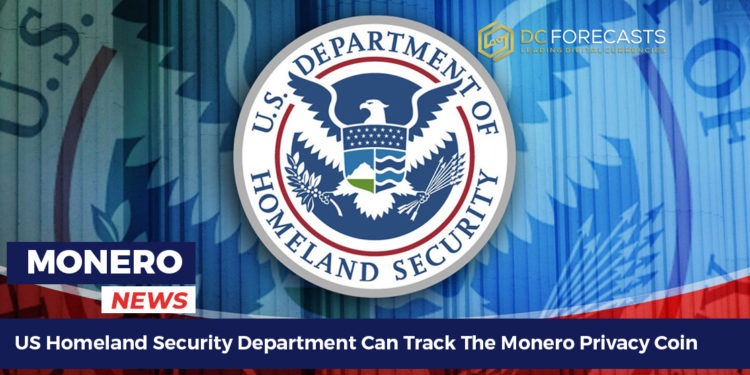US Homeland Security department will now be able to trace the Monero privacy coin with the help of CipherTrace that developed tools to do so. In our Monero news today, we are reading more about the new tool that can help trace the privacy coin.
The tools were created for the US Homeland Security Department as CipherTrace announced that they developed a new toolset for tracing Monero transactions, especially for this government agency. Monero gained popularity for its privacy-based design which made it the second most popular coin for dark web transactions after Bitcoin. The company claims that the tools will allow investigators to explore, search, and visualize XMR transactions.
CipherTrace Announces World’s First Monero Tracing Capabilities for Law Enforcement, Government, and Virtual Asset Service Providers https://t.co/jcP1tfaKzK #monero #privacycoins #blockchainanalytics
— CipherTrace (@ciphertrace) August 31, 2020
According to CipherTrace, the company spent a year working on the toolset which was performed via a contract with the DHS Science and Technology Directorate. About $2.4 million was paid out to the company for the contract which was signed in 2018 and had a potential value of $3.6 million. While the tools were developed for DHS to track illegally acquired user funds or stolen funds, CipherTrace suggests that exchanges and investment funds will benefit from knowing that they are not accepting the illegally obtained funds and they remain in compliance with regulations.
CipherTrace plans to add more functionality to the current version of the toolset which features “entity transactions clustering, wallet identification and exchange attribution” planned for the future. Today’s announcement seems like a huge blow for Monero but CipherTrace believes this is a good thing for the XMR future given that it was delisted from major exchanges already. The CEO of the company Dave Jevans said:
“Analytics is crucial to the survival of privacy coins because, if they cannot evaluate risks, some governments could make transacting with privacy coins extremely difficult or ban them outright, like Japan. Several Korean Exchanges delisted privacy coins and, just last week, several Australian exchanges banned Monero and Zcash. As privacy advocates ourselves, our hope is that by developing capabilities for tracing Monero, we can help to ensure Monero’s viability.”
Jevans also spoke with Matthew Aaron and shed light on how effective these tools are. According to him, tracing takes a whole other approach than Bitcoin tracing tools and the results are not definite. Still, it gives law enforcement something that they can cross-reference with other data and resources to help conduct the investigations:
“You can’t be as deterministic as Bitcoin. In tracing Monero, it’s really more of a probabilistic game. You can say: Well, I have 98% probability that this went from this address to this address, or 78%, or that type of thing. It takes a different approach, rather than [saying]: I’m going to guarantee everything is perfect…”
DC Forecasts is a leader in many crypto news categories, striving for the highest journalistic standards and abiding by a strict set of editorial policies. If you are interested to offer your expertise or contribute to our news website, feel free to contact us at [email protected]























Discussion about this post